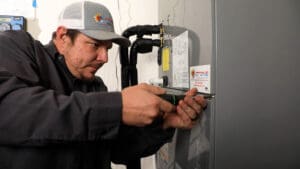Variable-Speed Fan Coil Units Can Make All the Difference
It may seem counter-intuitive to think about replacing or upgrading your heat pump as the weather is warming up, but now is a perfect time to make home improvements for more comfortable living later this fall. How were your utility bills this past winter? Do you feel like your heat pump is warming your home efficiently? Or do you find it’s running on auxiliary heat more than you’d like? Here’s a quick overview of how heat pumps operate and how replacing the auxiliary heat unit with a variable-speed fan coil may make sense for your home.
 How do heat pumps operate?
How do heat pumps operate?
Heat pumps are incredibly efficient units that provide heating and cooling to the home. With a heat pump, it is easy to keep your interior temperature at the temperature you like best, whether it’s a cool 68F or a warmer 72F. While this article focuses on heating, the pros at Stone Heating and Air can also give you options to upgrade or replace your heat pump to provide better and more efficient cooling for the summer.
A heat pump warms a house by transferring heat from the outside environment to the inside. It operates on the principle of refrigeration, utilizing a cycle of compression, condensation, expansion, and evaporation to move heat. In heating mode, the heat pump’s outdoor unit absorbs heat from the outdoor air, even in cold temperatures, and transfers it to the indoor unit.
The refrigerant within the system absorbs heat as it evaporates in the outdoor coil, then it is compressed, increasing its temperature, and pumped to the indoor coil, where it condenses, releasing heat into the indoor air. A fan then distributes the warmed air throughout the house via ductwork.
This process is efficient because it moves heat rather than generating it, making heat pumps an energy-efficient heating solution, particularly in moderate climates. Additionally, heat pumps can provide both heating and cooling, offering year-round comfort with a single system.
The challenge is that when temperatures dip down below 35F, it can be very difficult for the system to find any heat in the external air. In this case, most heat pump units include an auxiliary heating system. While auxiliary heat provides a secondary means to provide necessary warmth for the home, it does so at a higher expense. Because of that, you really don’t want to run auxiliary heat more than necessary.
How can a variable-speed fan coil unit help?
If your system relies too heavily on the auxiliary heat system, our expert teams at Stone Heating and Air have an innovative solution. In many cases, we can replace the auxiliary heat system with a variable-speed fan coil unit. Of course, we would first assess your entire system to make sure replacing one component is the most efficient and effective use of your investment.
A variable-speed fan coil can make a heat pump furnace more efficient compared to having an auxiliary heating element in several ways:
1. Optimized Airflow: Variable-speed fan coils can adjust their airflow based on the heating or cooling demands of the space. This means they can operate at lower speeds when less heating or cooling is required, which reduces energy consumption compared to running at a constant high speed.
2. Improved Comfort: Variable-speed fan coils can provide more consistent and even heating or cooling throughout the space by adjusting airflow and temperature more precisely. This helps maintain a more comfortable environment while using energy more efficiently.
3. Reduced Cycling: With variable-speed operation, the fan coil doesn’t have to constantly start and stop, as is the case with single-speed systems. This reduces wear and tear on the system and improves energy efficiency by avoiding the energy spikes associated with frequent cycling.
4. Better Integration with Heat Pump Operation: Heat pumps work by transferring heat from one place to another rather than generating heat directly. Variable-speed fan coils can better match the output of the heat pump to the heating or cooling needs of the space, optimizing the overall efficiency of the system.
5. Lower Energy Consumption: By operating more efficiently and effectively matching the output to the demand, variable-speed fan coils can reduce overall energy consumption compared to systems with auxiliary heating elements, which often operate at full capacity even when less heating or cooling is needed.
6. Smart Controls Integration: Variable-speed fan coils can often be integrated with smart thermostats and control systems, allowing for more precise temperature control and energy management based on occupancy schedules and environmental conditions.
Is it time for a professional inspection from Stone Heating and Air?
How would you like to be kicking back in comfort this fall with the peace of mind that your heating system is operating optimally? Schedule a routine maintenance and inspection now. If we find areas that need repair or improvement, our experienced HVAC team will discuss options you have within your budget. With Stone Heating and Air, you can expect the highest level of service and commitment in the industry to ensure your family is comfortable no matter what the weather is like outdoors. Contact us today to make an appointment.
Request An Appointment
Related Content


 How do heat pumps operate?
How do heat pumps operate?
